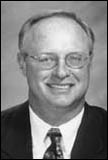President's message
 Reflections, change, and honoring two great men
Reflections, change, and honoring two great men
I sit here with a heavy heart as I write this last message. This message is one of my last official duties as your president of this great organization. This year has provided me with extraordinary opportunities and contacts. However, much change is consuming the meat industry, as issues like animal welfare and bovine spongiform encephalopathy (BSE) are gripping an already challenged business. My heart is heavy as well because the year has brought loss to my immediate family. These changes and losses remind me of one of my favorite thoughts, "When one door closes, several open." In some ways, this message is about life's lessons and how adjusting to change allows us to continue to enjoy and grow with our profession.
Reflecting on this year is very satisfying. First, our veterinary profession has successfully pushed forward in the US Congress "The Veterinary Medical Services Act." As this exciting development unfolds, food supply veterinary medicine will attract, nurture, and develop more and more students interested in rural and food supply veterinary medicine. Second, we are fast putting in place a large encompassing study to better assess and define the forward-thinking action plans to reverse the trend away from food animal veterinary medicine. Third, I have personally seen and discussed with many veterinary educators the evolving changes in the way we attract and educate our veterinary students. These developments are nothing short of amazing, as this much change rarely is accomplished in a decade, let alone a year. There are other achievements this year, but these are the most notable.
Change is all around us, as, in response to issues such as BSE and animal welfare, animal identification systems and auditing certifications will be introduced. Both of these business needs were never even a possibility as recently as 3 years ago. While they seem a burden and difficult to embrace at some levels, they will undoubtedly uncover new ways to market meat products in the future. As these issues are managed (in meat commerce), new ways to raise animals will also evolve. Data and information technologies will assist the meat industry in continuing to convince the consumer of the many advantages of meat protein.
Finally, I would like to honor two great men who have mentored my life. These two men have never sent an e-mail message or published in a peer-reviewed journal. They have never traveled to the far reaches of our world or even attended college. They were simple men who daily practiced the extraordinary discipline of quiet leadership in a profession that has recently lost much of its luster and charm. They each married once, between them had 113 years of marriage and raised 10 children, and never knew each other very well. They completely understood trust, integrity, friendship, leadership, and giving back to their community. They both farmed without the luxury and stability of irrigation. They both fell in love with livestock at an early age and spent their entire lives raising animals for food. Both men remained true to their religion and gave regularly to the Sunday collection.
My love for agriculture and passion for the great dimensions of the human spirit I learned through these men. One was my father-in-law and the other was my Dad. I learned volumes about how to treat people and animals from their great capacity to nurture each. I never knew my father-in-law until I met my wife the first year in college. He was a small man, barely 5'5" tall, but his spirit was gigantic. He and his wife raised and mentored my adorable wife, and for that I will always be profoundly grateful. We will be married 30 years next August.
My Dad was a larger man, about 5'11", and a master of tart humor. He taught me (among many things) the need to take measured risk. He also taught me to love business but practice it with great integrity. He strongly encouraged education but was quick to point out the extreme need for common sense in this ever-complicated world. He loved people and never gave up on them even when they let him down. He taught me how to stop and smell the roses on a regular basis, and the importance of having varied interests.
These men both loved, worked, and laughed regularly. They were not perfect, but as teachers and mentors, they were the best. They left our families within 4 months of each other. I miss them both daily.
I am adapting to the change (ie, the void) they left and reflect daily on what they brought to my life. Those of us close to food supply agriculture have many of the same insecurities and questions. We will move on, and tomorrow will bring many more opportunities than challenges. It just may not look like that at first!
Thanks for giving me this great adventure. The legacy of the AASV is in good hands for the many tomorrows ahead.
Your president,
--Rick Sibbel
